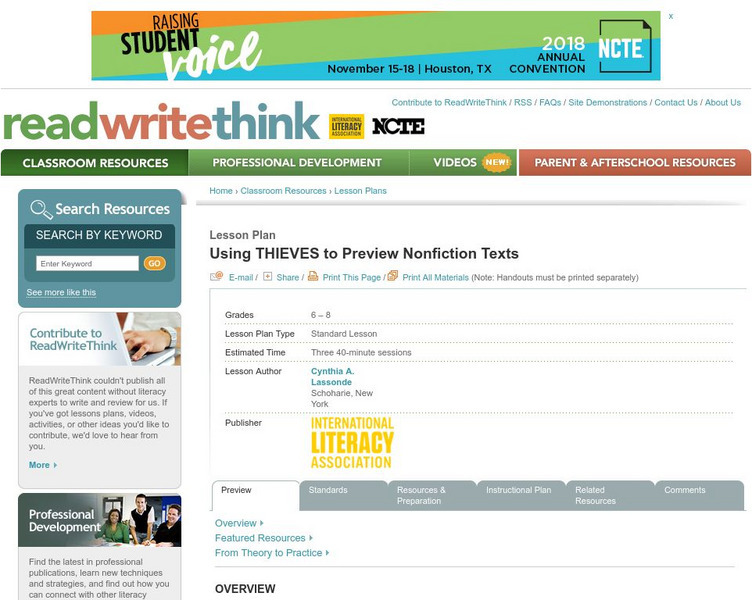Hi, what do you want to do?
Curated OER
Summarizing the Good Stuff
Young scholars summarize a selected piece of text nonfiction text. After reviewing the correct way to read silently, students read a nonfiction article. Working in groups, they write a summary paragraph using the five step process...
Curated OER
Summarization Know How
Students summarize a piece of text nonfiction text. After reviewing the correct way to read and summarize, students independently read a nonfiction article. They write a summary paragraph using the process outlined by the instructor...
Curated OER
Summarizing with Eeyore
Third graders summarize a selected piece of nonfiction text. After reviewing the correct way to use information to summarize, 3rd graders read a nonfiction article about author A.A. Milne. They write a summary paragraph using the process...
Curated OER
Summarizing What Counts
Students summarize a selected piece of text nonfiction text. After reviewing the correct way to read silently, students read a nonfiction article. Working in groups, they write a summary paragraph using questions provided by the instructor.
Curated OER
Putting it all Together
Students take notes and summarize information. In this communication lesson, students summarize information by taking notes using the various methods that their instructor presents to them. Students then write summaries of the information.
Curated OER
Visualizing Jazz Scenes From the Harlem Renaissance
Students identify themes of selected nonfiction, fiction, poetry and art to Harlem Renaissance jazz and describe the impact of jazz on African-American literature of the Harlem Renaissance
Curated OER
Technologies of the Civil War
Fifth graders discover new and interesting technologies of the Civil War. In this Civil War portfolio of lessons, 5th graders analyze primary resources, develop new vocabulary, investigate websites, and create a time line of new...
Curated OER
Loving Literature
First graders, after having "Are You My Mother?" by P.D. Eastman read to them, participate in group discussions or independentally work to analyze a spreadsheet to identify essential elements in the story and graph their data. In...
Curated OER
Reading Non-Fiction
Learners identify the key features of printed non-fiction texts. In this deciphering texts lesson, students watch a video clip of a news program and a children's program to compare presentations. Learners also identify...
Curated OER
Lost Worlds
Students, while using the strategy of identifying the main idea and supporting details, explore the three nonfiction selections of the lost worlds of Machu Picchu high in the Andes Mountains, Great Zimbabwe, and Anasazi. In addition,...
Curated OER
American Literature Unit Two
Students prepare for and respond to literature selections. This package includes nineteen lessons from the American Literature, A New Nation: 1750-1850 series, each covering a different reading selection. Pre-reading and response...
Curated OER
Measurement Mania
Second graders observe and demonstrate how to measure different objects. They listen to the book "Corduroy," and measure different aspects of a teddy bear, discuss how to measure using a variety of units of measurement, and complete a...
Curated OER
Wondering About Saturn: A Short History
Learners read an article about the history of Saturn. They complete reading comprehension tests. They examine what has been discovered on the planet.
Curated OER
Travels With Charley
Fifth graders engage in a literature study that uses a variety of texts in order to maximize their exposure to different reading situations. They examine each book in order to practice skills of reading comprehension. They recognize the...
Curated OER
Identifying Genre and Subgenre #2
In this identifying genre and subgenre #2 instructional activity, 9th graders read 17 short summaries, then select the genre and subgenre from the choices given and explain their choice in writing.
Curated OER
Discovering the Local Community
Third graders create a mini-atlas of the human and physical characteristics of their local community, which includes landforms, climate, vegetation, population, and economics. They use nonfiction map-related resources to obtain ...
Curated OER
Literary Circles
Learners use correct grammar, spelling and capitalization in their writing. They connect information acquired in history and science classes with the events described in the books that were read. Students make a clear and informative...
Curated OER
Comprehension Game for Guided Reading
Students play reading comprehension games. In this guided reading lesson plan, students play a comprehension game made by the teacher. Students may play the game before or after reading the story.
Curated OER
My Spacecraft to Saturn
Students discover problems that NASA must deal with on a daily basis. They work together to think of solutions and sketch their own idea of a spacecraft. They discover the concept of engineering.
Curated OER
The Purpose and Power of Persuasion
Seventh graders are introduced to and discuss the power of persuasion. After reading text, they identify the author's purpose, perspective and argument. They write their own fiction and non-fiction texts and develop a perspective after...
Curated OER
Fun with Balloons
Fifth graders design their own hot air balloon. In this science lesson plan, 5th graders investigate how factors like weight and sizes affect a balloon's lifting power. They also write math problems based on facts written in...
Curated OER
Writing Directions for Mathematical Activities
Fifth graders reorganize comic strips to have them make sense, complete outline and organize their thoughts into outline form to explain directions,
and use that outline to complete their own directions for geometry activities.
Polk Brothers Foundation Center for Urban Education at DePaul University
De Paul University: Center for Urban Education: Comprehensive Assessment: Nonfiction [Pdf]
Questions are provided to help students determine the main idea, topic, purpose, and opinion of a piece of nonfiction. Students are prompted to write a summary of the informational text.
ReadWriteThink
Read Write Think: Using Thieves to Preview Nonfiction Texts
Contains plans for three lessons that introduce a nonfiction prereading strategy with the acronym THIEVES, which stands for Title, Headings, Introduction, Every first sentence, Visuals and vocabulary, End Questions, and Summary. In...



























![De Paul University: Center for Urban Education: Comprehensive Assessment: Nonfiction [Pdf] Unknown Type De Paul University: Center for Urban Education: Comprehensive Assessment: Nonfiction [Pdf] Unknown Type](https://static.lp.lexp.cloud/images/attachment_defaults/resource/large/FPO-knovation.png)
